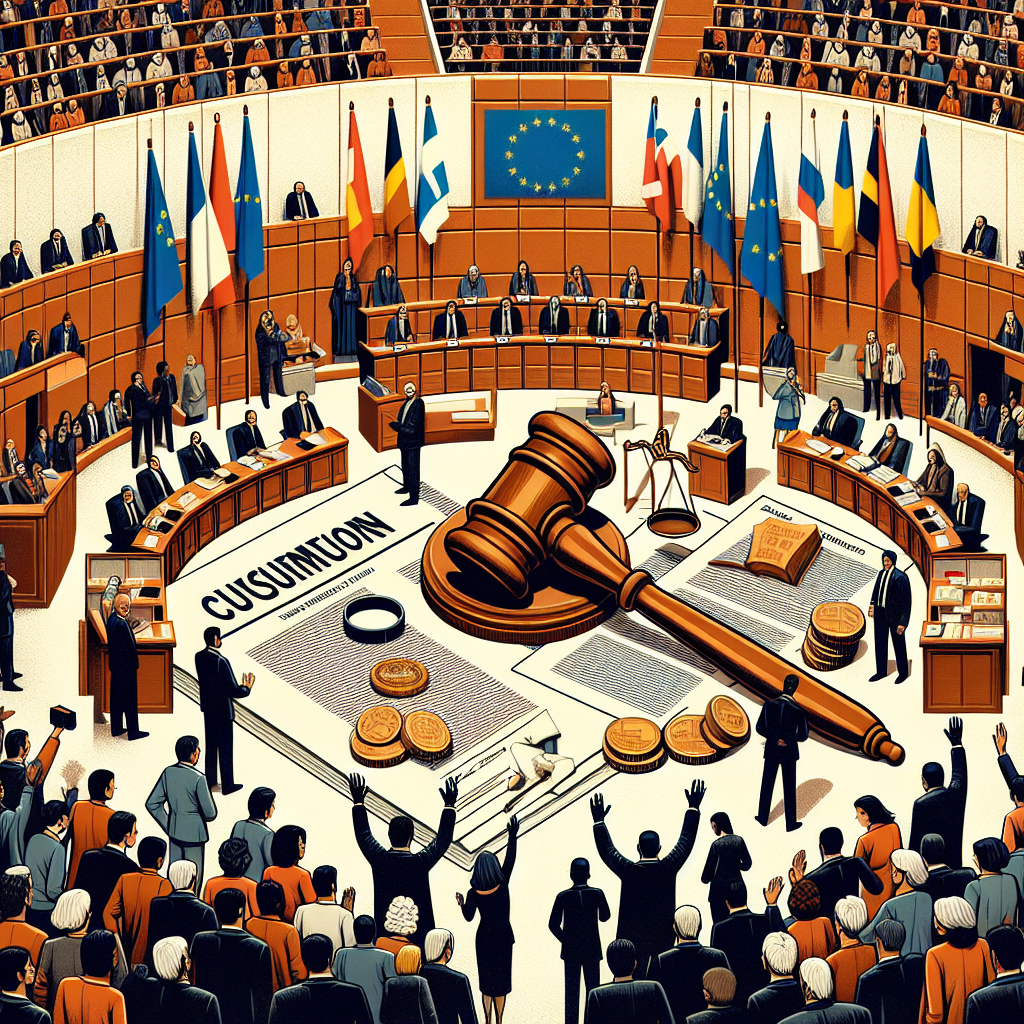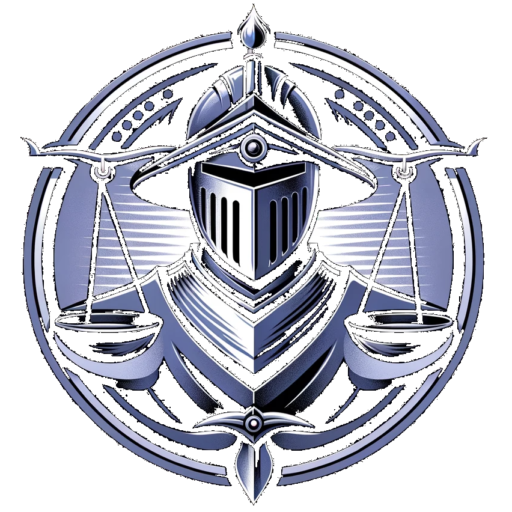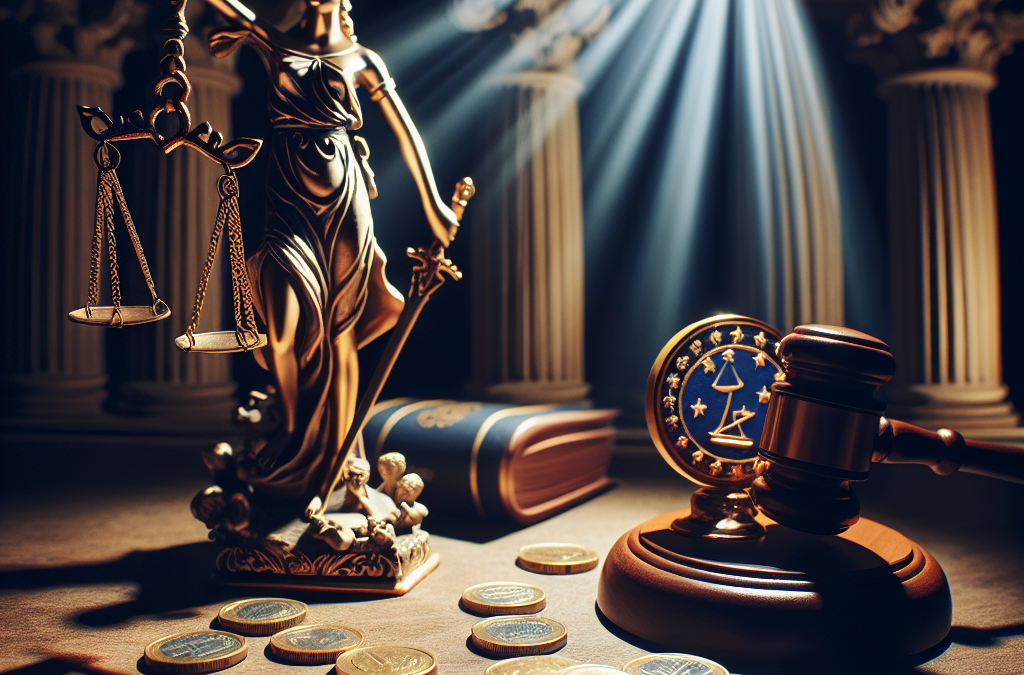“Exposing Corruption, Upholding Integrity: Triumph of Justice in the European Parliament Scandal”
Introduction
The European Parliament scandal, a significant event that shook the foundations of European politics, serves as a stark reminder of the importance of transparency and accountability in governance. This scandal, involving allegations of corruption, misuse of power, and unethical behavior by members of the European Parliament, brought to light the vulnerabilities in the political system and the need for stringent oversight mechanisms. The subsequent investigation and legal proceedings underscored the resilience of justice and the rule of law in the face of political malfeasance. The victory of justice in this context not only restored public faith in the democratic institutions but also reinforced the imperative for continuous vigilance in holding power to account. The scandal’s fallout led to a reevaluation of ethical standards and the implementation of reforms aimed at preventing future misconduct, thereby strengthening the integrity of the European Parliament and its commitment to serving the public interest.
Unveiling Corruption: The European Parliament Scandal Exposed
Holding Power to Account: The European Parliament Scandal and the Victory of Justice
In the annals of European governance, the European Parliament stands as a bastion of democracy, representing the interests of over 440 million citizens across the member states. However, the integrity of this esteemed institution was recently called into question, as it became embroiled in a scandal that shook the very foundations of public trust. The exposure of corruption within the European Parliament not only highlighted the vulnerabilities in the system but also underscored the relentless pursuit of justice by dedicated watchdogs and the legal system.
The scandal, which surfaced after meticulous investigations, involved allegations of bribery, money laundering, and influence peddling. High-ranking officials and members of the European Parliament were accused of accepting bribes from external entities seeking to sway legislative decisions in their favor. The revelations sent shockwaves throughout the continent, as citizens grappled with the disheartening reality of corruption at the highest levels of political power.
Amidst the turmoil, the response from the European Union’s law enforcement and judicial bodies was swift and decisive. The European Anti-Fraud Office (OLAF), in collaboration with national authorities, launched comprehensive investigations to unravel the extent of the malfeasance. The commitment to transparency and accountability was palpable, as the European public demanded answers and the assurance that those responsible would face the full weight of the law.
As the investigations progressed, the European Parliament took proactive measures to address the systemic issues that had allowed corruption to fester. Reforms were proposed to enhance the transparency of financial transactions and interactions between MEPs and third-party lobbyists. These reforms aimed to restore public confidence and ensure that such breaches of trust would not recur.
The pursuit of justice gained momentum as the legal proceedings advanced. The implicated individuals were subjected to intense scrutiny, and the evidence painstakingly gathered by investigators painted a damning picture of the corrupt practices that had taken place. The judiciary, upholding the principles of fairness and due process, ensured that the accused were given the opportunity to defend themselves against the charges.
Ultimately, the victory of justice was marked by the conviction of those found guilty. The sentences handed down served as a stark reminder that no one is above the law, and that even the most powerful can be held accountable for their actions. The European Parliament, chastened by the scandal, emerged with a renewed commitment to ethical conduct and the safeguarding of democratic values.
The European Parliament scandal, while a dark chapter in the history of the institution, also demonstrated the resilience of the rule of law and the unwavering determination to combat corruption. The collective efforts of investigative journalists, law enforcement agencies, and the judiciary played a pivotal role in bringing the truth to light and ensuring that justice was served.
In conclusion, the scandal has been a catalyst for change, prompting a reevaluation of the mechanisms in place to prevent corruption and the abuse of power. The European Parliament’s experience serves as a cautionary tale and a testament to the importance of vigilance in maintaining the integrity of democratic institutions. As the European Union continues to navigate the complexities of governance, the scandal will undoubtedly remain a touchstone for the ongoing efforts to hold power to account and uphold the principles of justice.
The Role of Whistleblowers in Upholding Democracy: Lessons from the European Parliament

Holding Power to Account: The European Parliament Scandal and the Victory of Justice
In the annals of democratic governance, the role of whistleblowers has been pivotal in safeguarding the integrity of institutions and ensuring that those in positions of power adhere to the highest standards of ethical conduct. The recent scandal that rocked the European Parliament serves as a stark reminder of the ever-present need for vigilance and the courage of individuals willing to expose wrongdoing. This episode not only underscores the importance of accountability but also celebrates the triumph of justice, a testament to the resilience of democratic systems.
The European Parliament, a bastion of democracy and representation for the citizens of the European Union, found itself embroiled in a controversy that threatened to undermine public trust. Allegations of corruption, influence peddling, and financial misconduct surfaced, painting a troubling picture of malfeasance within an institution designed to embody transparency and the rule of law. As the scandal unfolded, it became apparent that without the intervention of conscientious insiders, the transgressions might have remained shrouded in secrecy.
Whistleblowers, often at great personal risk, stepped into the limelight to shed light on the corrupt practices. Their actions, driven by a sense of duty to the public and the principles of justice, set into motion a series of events that would not only bring the perpetrators to account but also initiate a process of introspection and reform within the European Parliament. The bravery of these individuals cannot be overstated; they faced potential retaliation, ostracism, and career repercussions, yet they chose to prioritize the greater good over personal safety and comfort.
The revelations led to swift action by the authorities, with investigations launched to ascertain the depth and breadth of the corruption. The judicial process, though often slow and fraught with challenges, played a crucial role in ensuring that those accused were afforded due process while meticulously unraveling the complex web of illicit activities. As the wheels of justice turned, it became evident that the system, although not impervious to corruption, possessed the mechanisms to correct its course and uphold the principles it was founded upon.
Moreover, the scandal served as a catalyst for reform within the European Parliament. It prompted a reevaluation of existing policies and procedures, highlighting areas where oversight was lacking and where transparency could be bolstered. The institution’s commitment to reform demonstrated a recognition of the need to restore public confidence and to prevent future instances of corruption. This proactive stance is a positive outcome of an otherwise disheartening series of events, showcasing the capacity for self-improvement within democratic entities.
The European Parliament scandal, while a blemish on the reputation of the institution, ultimately reinforced the indispensable role of whistleblowers in maintaining the health of democracies. Their actions remind us that power, left unchecked, can lead to abuses that erode the very foundations of our societies. The victory of justice in this case is a victory for all who believe in the principles of democracy and the rule of law. It is a clarion call for continued vigilance and an affirmation of the power of individuals to effect change, even against formidable odds.
As we reflect on the lessons from the European Parliament, it is clear that whistleblowers are not merely ancillary to the democratic process; they are its guardians. Their courage and commitment to truth are essential in holding power to account, ensuring that the institutions meant to serve the public do so with integrity and honor. The scandal, while regrettable, has provided an opportunity to fortify the safeguards of democracy and to celebrate the enduring spirit of justice.
Triumph of Transparency: How Justice Prevailed in the European Parliament Scandal
Holding Power to Account: The European Parliament Scandal and the Victory of Justice
In the annals of democratic institutions, the European Parliament stands as a beacon of transnational governance and legislative oversight. However, its integrity was recently put to the test in a scandal that threatened to undermine public trust in the entire European Union. The scandal, which involved allegations of corruption, money laundering, and the misuse of power by several members of the European Parliament, sent shockwaves through the political landscape of Europe. Yet, in the face of such adversity, the triumph of transparency and the victory of justice have emerged as testament to the resilience of the rule of law.
The scandal unraveled as investigative journalists and legal authorities unearthed a web of illicit activities. Accusations of accepting bribes in exchange for political favors and influencing parliamentary decisions for personal gain cast a shadow over the institution. The public outcry was immediate and intense, demanding accountability and the restoration of integrity to the esteemed body. As the scandal unfolded, it became clear that the European Parliament was at a crossroads, with the potential to either succumb to corruption or to rise above it through decisive action.
In response to the burgeoning crisis, the European Parliament took swift measures to address the allegations. The establishment of a transparent investigation, led by an independent body, signaled a commitment to upholding democratic values and the rule of law. The inquiry was meticulous and thorough, leaving no stone unturned in its pursuit of the truth. As evidence mounted, it became evident that those implicated would face the full force of justice.
The legal proceedings that followed were a testament to the robustness of European judicial systems. The accused were afforded due process, and the trials were conducted with the utmost respect for legal protocols. The public was kept informed at every stage, reinforcing the principle of transparency that is so vital to democratic governance. The judiciary’s independence from political influence ensured that the outcomes of the trials were based solely on the evidence presented.
Ultimately, the verdicts handed down by the courts served as a powerful deterrent to any who might consider abusing their positions of power. The sentences meted out reflected the severity of the offenses and the betrayal of public trust. The message was clear: no one is above the law, and accountability is non-negotiable in a society that values justice and fairness.
The resolution of the European Parliament scandal has had far-reaching implications. It has reinforced the importance of vigilance in the face of corruption and the necessity of robust mechanisms to detect and deter such behavior. The scandal has also underscored the critical role of a free press and an informed citizenry in holding power to account. Journalists who brought the scandal to light and citizens who demanded action were instrumental in ensuring that justice was served.
In the aftermath of the scandal, the European Parliament has emerged stronger and more committed to upholding its ethical standards. Reforms have been implemented to enhance transparency and prevent future misconduct. These measures have restored some of the lost confidence in the institution and have demonstrated to Europe’s citizens that their voices matter and that their representatives are answerable to them.
The victory of justice in the European Parliament scandal is a reminder that, even in the face of daunting challenges, the principles of transparency, accountability, and the rule of law can prevail. It is a victory not just for the European Union, but for all who believe in the fundamental tenets of democracy. As the European Parliament continues its work, it does so with a renewed sense of purpose and a reaffirmed commitment to serving the public with integrity and honor.
Conclusion
The European Parliament scandal, which involved allegations of corruption and misuse of power among its members, highlighted the importance of transparency and accountability within governmental institutions. The subsequent investigation and legal proceedings that led to the exposure and punishment of those involved can be seen as a victory for justice. This outcome reinforces the principle that no one is above the law and that institutions must have robust mechanisms to detect and address misconduct. The scandal also underscores the need for continuous vigilance and reform to prevent such abuses of power in the future.

